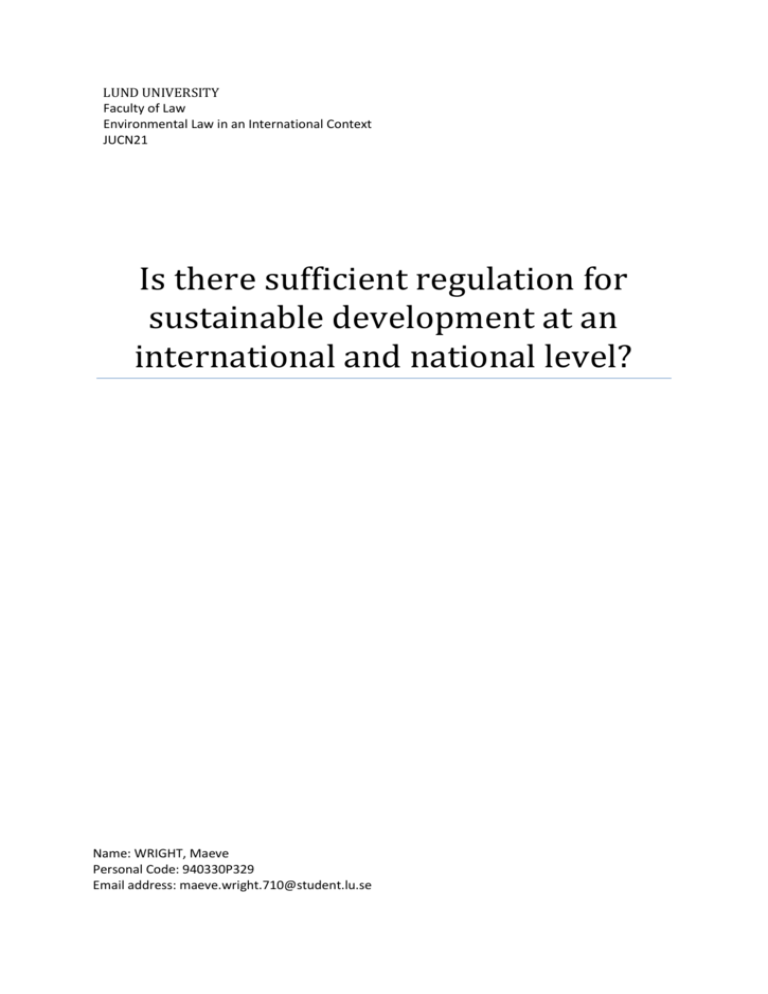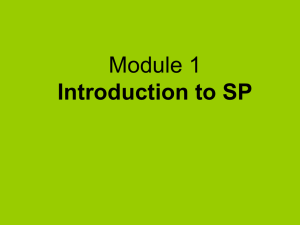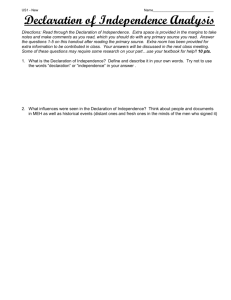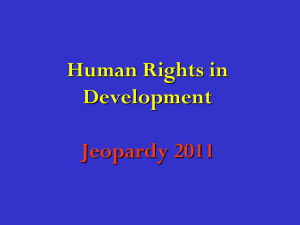Is there sufficient regulation for sustainable development at an
advertisement

LUND UNIVERSITY Faculty of Law Environmental Law in an International Context JUCN21 Is there sufficient regulation for sustainable development at an international and national level? Name: WRIGHT, Maeve Personal Code: 940330P329 Email address: maeve.wright.710@student.lu.se Table of Contents 1. Introduction 2 1.1 Background 2 1.2 Purpose, research question and delimitation 2 1.3 Method and outline 3 2. The Concept of Sustainable Development 4 2.1 Sustainable development as a branch of law 5 3. Current International Provision for Sustainable Development 6 4. Sustainable Development at a National Level 10 5. The influence of the European Union 13 6. Analysis and conclusion 15 Bibliography 17 Page 1 of 18 1. Introduction 1.1 Background The concept of sustainable development has arisen through the acknowledgement of the need to balance economic growth with environmental protection. Since the 1970’s there have been a number of global conventions in which sustainable development has been of primary focus, and importantly there has been acknowledgement of the necessity of international cooperation in this area. However, there is a lack of clarity surrounding the concept and how it should be regulated at both international and national level. The nature of sustainable development combines international economic, environmental and social law and there is no single overarching framework for sustainable development. Rather, it is regulated through a combination of legal instruments, norms and treaties. 1.2. General purpose, Research Questions and Delimitations This essay will analyse the regulation of sustainable development. The aim of this essay will be to determine whether or not current international instruments provide sufficient provision for sustainable development, and how the principles are implemented at a national level in the United Kingdom. Sustainable development for the purpose of this essay is defined as a concept rather than a principle due to the lack of official recognition as a legal principle in itself. However, due to the restraints of this essay there will be limited discussion of this, with focus instead on development of regulation in the area of sustainable development. Furthermore, the scope of this essay will not allow for detailed examination of all regulation that is in place. Instead, a brief summary of the main declarations that have arisen as a Page 2 of 18 result of global conventions will be discussed, with detailed analysis of the New Delhi Declaration1. When analysing the regulation of sustainable development from a national perspective the United Kingdom has been chosen as the country of focus. The UK is also a member of the European Union, and the role that the EU plays in ensuring the adoption of sustainable development by member states will be discussed. 1.3 Method and Outline Firstly, the emergence of the concept of sustainable development will briefly be considered, and subsequently whether it has become an accepted principle of international law, or whether it is an emerging customary norm in its own right will be looked at. The fact that sustainable development concerns different policy areas, and the way it is more often governed through soft law will also be mentioned. Following from this, an outline of the history of global conventions and resulting declarations relating to sustainable development will be given, specifically the Rio Declaration 1992, the Stockholm Conference 1972, the New Delhi Declaration 2000, and the Johannesburg Declaration 2002. There will then be an analysis of how the concept of sustainable development has been incorporated at a national level in the United Kingdom. This will include discussion of the problems that have been encountered, the influence of the European Union, and what the future may hold. In achieving the purpose of this essay a legal dogmatic approach will be taken. The main sources used in this essay will be the reports and declarations released as a result of international conferences, including official documents from the EU and United Nations. 1 ILA New Delhi Declaration of Principles of International Law Relating to Sustainable Development, International Environmental Agreements 2002, Volume 2, Issue 2, pp 209-216 Page 3 of 18 When discussing national regulation, official documents and press releases from the UK Government as well as UK legislation will also be used. This essay will aim to conclude whether or not the regulatory provision relating to sustainable development is sufficient, and what must be done in the future to ensure the balance between economic growth and environmental protection. 1. The concept of sustainable development The concept of sustainable development has emerged through acknowledgement of the connection between the economy, development and the environment. The effect of continued economic growth on the environment and the depletion of natural resources must be acknowledged and controlled. The two are dependent on each other and economic growth cannot continue without protection of the environment. The exact definition of the term sustainable development is a matter for debate. However, for the purposes of this essay the widely accepted explanation of the concept formed by the World Commission on Environment and Development in what is known as the Brundtland Report will be used. This states that “Sustainable development is development that meets the needs of the present without compromising the ability of future generations to meet their own needs”2. The report goes on to establish two important concepts within sustainable development. Firstly, focus is put on 'needs', with priority being given to those things essential for human life such as food, water, shelter and clothing. The second principle highlighted is environmental limitation, and acknowledgement of the fact that resources are limited and must be used sensibly. The report established a need for policies and regulation to ensure the most efficient and sustainable use of resources. The main aim of development is to fulfil human want and needs. However, in order to achieve this in a fair and just way account must be taken of all people, and there must be 2 Chapter 2, Brundtland G et al (1987) Our Common Future: Report of the 1987 World Commission on Environment and Development, Oxford, Oxford University Press Page 4 of 18 balance between those in developing countries and those in developed countries. Depending on their backgrounds people have different ideas of what they need in life. Basic human needs, such as food, water, shelter and clothing may be the focus of those in developing countries. In contrast, others take these things for granted and instead may aspire to a higher standard of living. There must be limitations in allowing development beyond these basic needs. Increased economic growth and expansion in the use of resources in developed countries must be weighed against the need to ensure all people have an adequate standard of living. The most efficient way to ensure this is to take an international approach and have a unified system for the regulation of sustainable development. However, although international policies exist, the contrast and differences in economic growth in developed and developing countries makes for differing approaches in the implementation of sustainable development regulations at a national level. Therefore global unanimity is in practice hard to achieve. 2. Sustainable Development as branch of Law Gradually, sustainable development has been accepted in international law through the amalgamation of economic growth, social justice (including human rights) and environmental protection objectives3, to allow for the improvement in the overall quality of life for all generations. Arguably ‘sustainable development law’ has come to be accepted as a branch of international law which encompasses a variety of principles and instruments which combine economic, social and environmental law with the aim of allowing for continued development. The majority of specific regulation of the concept is increasingly found in international treaties specifically provide sustainable development goals, and in turn the concept has begun to be recognised globally at a national level in courts and tribunals. Although sustainable development is mainly dealt with through ‘soft law’, in declarations and international statements, these instruments carry an increasingly persuasive force and 3 http://www.cisdl.org/research-publications-events.html Page 5 of 18 they help to clarify the application of sustainable development and coordinate law and policy. At a national level, law and regulation is an extremely important part of sustainable development. Society is structured in a way whereby individual actions are restricted and influenced by the rule of law. Through means of enforcement laws and regulations are followed and this structure of governance is key to the success of sustainable development. 3. Current International Provision for Sustainable Development The concept of sustainable development within international law has emerged through recognition of the importance of being aware of how the action of one state may affect another, particularly in relation to potential damage to the environment. The acknowledgement of the cross boarder effects that environmental damage can have has led to a more unified approach in dealing with environmental issues. Subsequently, there have been a number of global environmental conferences. The ‘United Nations Conference on the Human Environment’ held in Stockholm in 1972 being the first of such meetings. This was the first major discussion at a global level which established links between environmental degradation and protection, alongside economic and social development of all countries, and marked the evolution of the concept of sustainable development. The United Nations (UN) ‘World Commission on Environment and Development’ report entitled ‘Our Common Future’, more commonly known as the Brundtland Report, arose a number of years later. This was the first official mention and inclusion of the term ‘sustainable development’ in global policy, and established a widely recognised definition of the concept.4 4 See Chapter 1 Page 6 of 18 This was followed by the ‘United Nations Conference on Environment and Development’ held in Rio in 1992. 172 states were in attendance alongside multiple corporations and intergovernmental and non-governmental organisations5. The conference led to the establishment of what is known as the ‘Rio Declaration’ and Agenda 21. The Rio Declaration builds upon the Stockholm Declaration, and aims to coordinate the relationship between developed and developing countries. However, the declarations use of the term sustainable development is still somewhat ambiguous and it provided more general guidelines than a solid legal framework. This can be seen in Principle 27 of the Declaration which establishes the aim that: “States and people shall cooperate in good faith and in a spirit of partnership in the fulfilment of the principles embodied in the Declaration and in the further development of international law in the field of sustainable development”.6 It should also be noted that this principle assumes that sustainable development is already in existence within international law. Furthermore, Principle 16 of the Rio Declaration emphasises that “national authorities should endeavour to promote the internalization of environmental costs and the use of economic instruments, taking into account the approach that the polluter should, in principle, bear the cost of pollution, with due regard to the public interest and without distorting international trade and investment”.7 Agenda 218 also arose from the Rio Conference. It establishes a global partnership for sustainable development and emphasises participation at an international level. However, Agenda 21 and the Rio Declaration are not binding instruments, and ultimately implementation of the principles within them rests on governments at a national level. However, the United Nations is influential, particularly in encouraging international cooperation. 5 See http://www.un.org/geninfo/bp/enviro.html for information about participants. Rio Declaration on Environment and Development, Report of the United Nations Conference on the Human Environment, Stockholm, 5-16 June 1972 (United Nations publication, Sales No. E.73.II.A.14 and corrigendum) 7 Ibid 8 .Agenda 21, United Nations Conference of Environment & Development, Rio de Janerio, Brazil, 2 to 14 June 1992 6 Page 7 of 18 Numerous other global conferences have since taken place, explicitly dealing with ‘sustainable development’. The Johannesburg Declaration introduced a new perception of sustainable development, by emphasising the importance of integrating economic development, social development and environmental protection. These areas can be seen as interdependent on each other. The declarations overall aim is to establish more efficient means of production and consumption, protect environmental resources and encourage social development in a sustainable way. This will help to diminish poverty in developing countries. The New Delhi Declaration of Principles of International Law Related to Sustainable Development9 was released in 2002 by the International Law Association Committee on the Legal Aspects of Sustainable Development, and is one of the most influential documents in relation to the regulation of sustainable development. The declaration highlights seven main principles, some of which are highlighted below. Firstly, “the duty of States to ensure sustainable use of natural resources”10 provides that all states have the right to govern their natural resources however they see fit through their own national legislation. However, this comes with an overarching responsibility not to have a negative impact on the environment of other states. States must not be short sighted in the use of their resources, and must always act with the implications their actions will have on future generations in mind. “The principle of equity and the eradication of poverty”11. This takes into account the rights of the needs of future generations and balances them against the rights of the present generation, with regard to the use of natural resources. In the present generations use and enjoyment of natural resources there must be an awareness of the impact this will have on future generations. 9 4 ILA Resolution 3/2002: New Delhi Declaration Of Principles Of International Law Relating to Sustainable Development , in ILA, Report of the Seventieth Conference, New Delhi (London: ILA, 2002). 10 Ibid , Principle 1 11 Ibid, Principle 2 Page 8 of 18 The third principle is “The principle of common but differentiated responsibilities”12. The aim of this is that states should work together to attain global sustainable development targets and protect the environment. Recognition must be made of the differences between developing and developed countries and the impact that environmental, social and developmental considerations may have. Developed countries must take overall responsibility in ensuring the eradication of unsustainable growth and assist developing countries in strengthening themselves. “The principle of common but differentiated responsibilities”13 acknowledges that states must work together in order for sustainable development to succeed, and this includes the involvement of both governmental and non-governmental organisations, and corporations. The precautionary principle14 is primarily about the avoidance of activities that have the potential to negatively impact human health, the environment and natural resources. This involves being aware of the uncertain outcome of some technological or scientific advancements. The principle of integration and interrelationship, in particular in relation to human rights and social, economic and environmental objectives15 emphasises that all these areas touch upon sustainable development and coordination between the areas is necessary for sufficient regulation. This involves cooperation at all levels from global to national to local policies, and is fundamental to the achievement of sustainable development. The above principles, in addition to others, form a framework for sustainable development. In the absence of a more official international agreement, they are central in guiding national governments as to what they should aim for. The global reach of the declaration also ensures international consistency. 12 Ibid, Principle 3 Ibid, Principle 3 14 Ibid, Principle 4 15 Ibid, Principle 7 13 Page 9 of 18 In addition to these conventions, more recently, in May 2003 the International Committee on International Law on Sustainable Development was formed. Its main objective was to focus on the legal status and implementation of sustainable development. 4. Sustainable Development at a National Level Due to the nature of implementing sustainable development, and differing approaches, analysis of the concept at a national level is not straightforward. Furthermore, research and analysis in the area at a national level is often limited or ambiguous. However, global declarations such as the New Delhi Declaration have led to a certain amount of coordination between different states. To examine the incorporation of sustainable development at a national level further, the provisions in place in the United Kingdom will be looked at. There is no overall sustainable development framework within UK environmental law. Instead sustainable development is implemented in practice through policy and recommendations. Although there is some provision for sustainable development incorporated within other existing legislation. For example Sites of Special Scientific Interest (‘SSSIs’) are protected under the Wildlife and Countryside Act 1981, and development on these sites is dealt with principally through Planning Policy Statement 9 Biodiversity and Geological Conservation16. Other positive advances in support of the concept within in the UK include sustainable development being a key feature of national climate change legislation. In particular the Climate Change Act 2008 (CCA) set the target of cutting emissions of greenhouse gases by 80%, from the 1990 levels by 2050. This agenda by nature influences other policy areas, which must take the policy into account. This type of approach is key to the success and regulation of sustainable development in the UK. Governments in creating new legislation must take on board the recommendations in the CCA. This can be shown in the case of R (on the application of London Borough of Hillingdon and others) v Secretary of State for 16 Communities and Local Government Committee – Eighth Report, Chapter 4,2005 Sustainable Development Strategy Page 10 of 18 Transport17. This case dealt with the expansion of Heathrow, and the outcome of the case was that a decision in support of expansion should be reconsidered due to the Climate Change Act. This application of the CCA highlights that the UK is able to successfully produce and enforce legislation which promotes sustainability. In the United Kingdom, and many other countries the basic institutional structure and provision for policy to achieve sustainable development at a national level does exist. However, often governments can be short sited and new policies often look to achieving present goals rather than taking the welfare of future generations into account. This results in some existing principles, policies and good practice relating to sustainable development often being ignored. It can be argued that the regulation of sustainable development in the UK lacks sufficient leadership. With changing governments, and devolved Parliaments the UK, the approach taken has varied over time and between jurisdictions and sectors. There is inconsistency in relation to the true understanding of the concept and no coherent framework or order of priority in decision making. For example, when the Labour Government was in power in 1999 sustainable development was a main policy consideration featured in a White Paper entitled ‘A better quality of lie’. To ensure that the Government made progress in this area, Deputy Prime Minister John Prescott established the Sustainable Development Commission (SDC), a non-departmental public body charged with the role of advising the UK Government on sustainable development. The commission reported directly to the Prime Minister of the United Kingdom, and each of the First Ministers in the various devolved Governments that make up the UK. The commission officially oversaw sustainability through considering progress made toward meeting targets, and support across different departmental bodies. During its time the 17 R (on the application of London Borough of Hillingdon and others) v Secretary of State for Transport [2010] EWHC 626 (Admin) Page 11 of 18 commission published a number of reports and recommendations regarding sustainable development. However, when the Coalition Government came into power the Commission lost its funding and was shut down in 2010. This came with a lot of criticism, and was seen as a backward step in ensuring the protection of the environment for future generations. Under the 2010 to 2015 Conservative and Liberal Democrat coalition government an article was published in 2011, stating that the UK Government would support an initiative to build Sustainable Development Goals. This recognised the importance of working together with other states to ensure protection of the world’s natural resources. This was shown through meetings between the UK Deputy Prime Minister Nick Clegg and President Santos of Colombia. This marked the UK as one of the first developed countries to officially back the Sustainable Development movement. Deputy Prime Minister Nick Clegg Said: “I welcome President Santos’s initiative, challenging world leaders to establish Sustainable Development Goals and look forward to working closely with the Colombian government and our international and EU partners to develop this idea in the run-up to the Rio+20 summit in June next year.”18 With a new Conservative Government recently elected in the UK, it remains to be seen what will happen in the upcoming future with regard to a plan for the regulation and promotion of the concept of sustainable development in the UK. In order to make positive progress the role and stance of sustainable development in relation to economic growth and the environment must be clarified. The UK has a strong legal framework, in which the incorporation of sustainable development is possible. Although this already exists to a certain extent perhaps the introduction of stricter guidelines and enforcement would help in clarifying the governance of the concept. 18 ‘Deputy Prime Minister and Environment Secretary welcome initiative on Sustainable Development Goals’, UK Government Press release, November 2011 Page 12 of 18 5. The influence of the European Union The UK is a member of the European Union, and as a result EU Law also has an influence on the application of sustainable development at national level. EU regulation, like international declarations, provides a framework for consistency between states and also highlights the relationship and correlation of practices at a national level. Article 11 (ex Article 6 TEC) of the consolidated version of the Treaty of the Functioning of the European Union19 establishes the integration principle and makes particular reference to environmental concerns, stating that “Environmental protection requirements must be integrated in the definition and implementation of the Community policies and activities, in particular with a view to promoting sustainable development”. This establishes awareness of the environment as a specific duty of the union, and emphasises this as being a part of the overall goal of sustainable development. This means through awareness of environmental protection in creating new policies and enforcing existing ones the principle of sustainable development can be incorporated into all European policies. Despite being explicitly mentioned, sustainable development in itself is still not awarded the status of legal principle within the EU. Rather it is treated as an objective which should be strived for through other policies. However, the imposition of the duty to incorporate environmental requirements on community institutions does positively promote the enforcement of sustainable development. It places a duty on community institutions to integrate environmental requirements and thus promote sustainable development. Furthermore, as well as including the principle in the establishment of policies, the European institutions must also ensure implementation of these objectives. This therefore 19 The 2007 Lisbon Treaty amended the Treaty on European Union and the Treaty on the Functioning of the European Union, and created a consolidated version of both. What was Article 6 now comes under Article 11 of the consolidated version of the Treaty on the Functioning of the European Union. Page 13 of 18 means that the commission, council and parliament are all involved in ensuring the goal of sustainable development is achieved. Measures in support of sustainable development continue to be adopted by the European Union. For example, an EU sustainable development strategy was introduced by the Council of the European Union in June 2006.20 This consolidates the commitment that the EU has to the concept of sustainable development. Support for sustainable development is present in a number of EU policies, for example climate change. Yet despite this, in some areas efforts to implement sustainability need to be increased. The 2009 review of European Union Sustainable Development Strategy21 examines the existing EU policy measures covered by the EU SDS and also looks at the future of the EU SDS and how this interplays with the Lisbon strategy. It concludes that sustainable development is a fundamental objective of the EU under the Lisbon Treaty, which provides an “overarching policy framework for all Union policies and strategies”. However clearer governance, implementation and monitoring is still needed. Recent developments have shown the progressive and active role of the European Institutions in influencing global initiatives. A resolution was passed in November 2014 by the European Parliament which supports the construction of a unified and thorough global development framework after 2015. Support for this was reiterated by the European Council in 2014, which recognised the success of this agenda as a key goal for the EU. This principle of ‘universality’ is important to the success of implementing sustainable development. EU goals and policies will only be successful if each member state adopts these policies at a national level. Only then will sustainability goals be achieved collectively. 20 See European Council Doc 10117/06 of 9 June 2006 Mainstreaming sustainable development into EU policies: 2009 Review of the European Union Strategy for Sustainable Development, Communication from the commission to the European Parliament, the Council, the European Economic and Social Committee and the Committee of the Regions, Brussels, 24.7.2009 COM(2009) 400 final 21 Page 14 of 18 In creating new policies and regulations Governments and International bodies must keep the true aim of sustainable development at the forefront, and not use it as an ‘umbrella term’ for other issues. The international community is scheduled to meet in September 2015 in order to agree on a new framework for sustainable development, with the overall aim of eradicating poverty. The EU plays a significant part in this. The current European Commissioner for International Cooperation and Development is focussed on the establishment of a universal post-2015 development agenda, with focus on introducing legitimate means to implement this. The summit, which is to be held in New York in September, should result in a unified approach toward eradicating poverty and sustainable development. Analysis and conclusion It is clear from the number of international conventions and inclusion of the concept in EU regulations that there is a growing acceptance and recognition of the importance of sustainable development on a global level. It can be said that sustainable development is beginning to become embedded into global policy, and thus is also now being incorporated into national law. This can be seen in the UK through government policy and initiatives which acknowledge sustainable development as an important ongoing goal. However, ultimately the very nature of the concept means that for sustainable development to be successful, it must be accepted an implemented on a global scale. This requires states to work in coordination with one another. The support given by the EU institutions helps to unify the European countries in achieving this. The main problem that remains is balancing developed and developing countries needs and wants. In order to develop and be able to support themselves developing countries must have the support of the developed countries, and likewise developed countries must Page 15 of 18 balance their growth and use of resources to ensure that those in developing countries and future generations have sufficient resources. The evolutionary nature of sustainable development means that new policies continue to develop. Positive progress is being made, and this is shown through the acceptance of sustainable development as a concept at both on an international and national level. However, more needs to be done to create a framework which regulates sustainable development and stricter enforcement measures should be introduced. The achievement of sustainable development is also an ongoing target which will always need to be actively maintained. The concept is difficult to regulate as there is no clear definition of the term, and it is not possible to make specific regulations or laws which can apply unanimously to all states. Each country must aim to maintain sustainable development through incorporation of the concept in their own way through national laws and policies. Finally, it must be reiterated that the goal of achieving sustainable development is only possible if there is international unanimity. States must support each other and balance the needs of developed and developing countries, in order to provide a sustainable future for generations to come. Page 16 of 18 Bibliography Brundtland G et al (1987) Our Common Future: Report of the 1987 World Commission on Environment and Development, Oxford, Oxford University Press Cuillerier P, Sustainable Development and the Role of Environmental Law Enforcement, Office of Enforcement Environment Canada, Hull (Quebec) Global Declarations Agenda 21, United Nations Conference of Environment & Development, Rio de Janerio, Brazil, 2 to 14 June 1992 ILA New Delhi Declaration of Principles of International Law Relating to Sustainable Development, International Environmental Agreements 2002, Volume 2, Issue 2, pp 209-216 The Johannesburg Declaration, Adopted at the 17th plenary meeting of the World Summit on Sustainable Development, on 4 September 2002, A/CONF.199/20* 1992 Rio Declaration on Environment and Development, UN Doc. A/CONF.151/26 (vol. I) /31 ILM 874 (1992) / United Nations publication, Sales No. E.73.II.A.14 and corrigendum Declaration of the United Nations Conference on the Human Environment (Stockholm Declaration), U.N. Doc. A/Conf.48/14/Rev. 1(1973); 11 ILM 1416 (1972) European Union Legislation Consolidated Treaty on the Functioning of the European Union (2007) Lisbon Treaty 2007 The review of the EU sustainable development strategy, European Council Doc 10117/06 of 9 June 2006) Page 17 of 18 Mainstreaming sustainable development into EU policies: 2009 Review of the European Union Strategy for Sustainable Development, Communication from the commission to the European Parliament, the Council, the European Economic and Social Committee and the Committee of the Regions, Brussels, 24.7.2009 COM(2009) 400 final UK Legislation and sources Communities and Local Government Committee – Eighth Report, Chapter 4,2005 Sustainable Development Strategy Climate Change Act 2008 Wildlife and Countryside Act 1981 R (on the application of London Borough of Hillingdon and others) v Secretary of State for Transport [2010] EWHC 626 (Admin) Online Resources http://www.cisdl.org http://www.un.org/geninfo/bp/enviro.html https://www.gov.uk/government/news/deputy-prime-minister-and-environment-secretarywelcome-initiative-on-sustainable-development-goals Word Count: 4,462 Page 18 of 18








